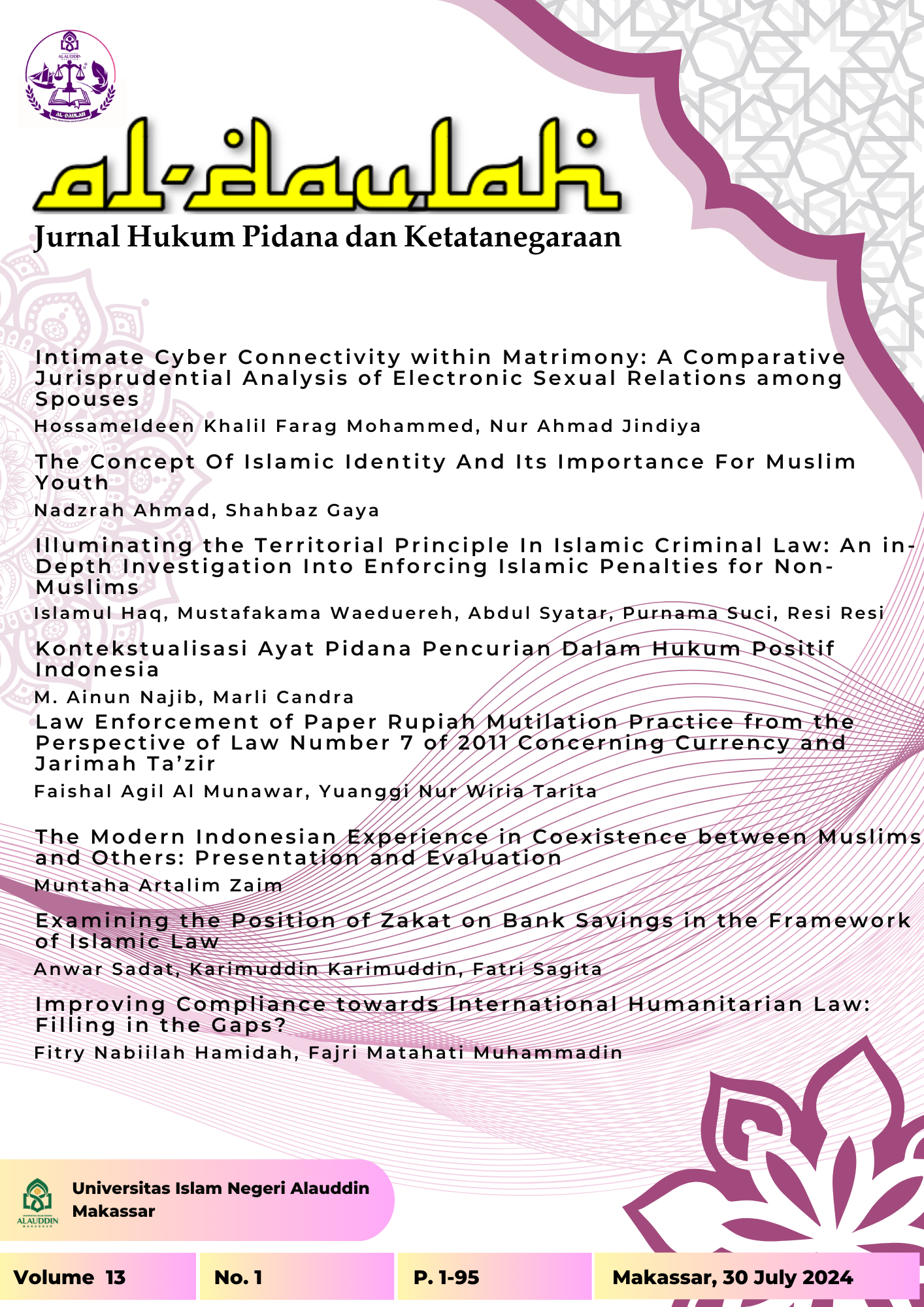Implementation of the Job Creation Law on the Supervisory Function of Foreign Workers by the Manpower and Transmigration Service
Abstract
The phenomenon of the high number of foreign workers (TKA), which is increasing every year in Indonesia, especially in the Central Sulawesi region, of course, means that the supervisory function carried out by the Central Sulawesi Province Manpower and Transmigration Service will be increasingly strict. However, since the existence of the Job Creation Law, employment agencies have changed the supervisory function of TKA. The research aims to analyze the role of the employment service in carrying out the supervisory function of foreign workers entering the Central Sulawesi region after the existence of the Job Creation Law. The research method used in this research is Normative Juridical research, which will examine the role of the employment department's supervisory function from changed aspects of the Job Creation Law. To examine how the law should apply. where based on cases in the field, researchs try to analyze facts and also applicable legislation. The research results show that the supervisory function of the Manpower Service after the existence of the Job Creation Law still provides a mandate similar to the Manpower Law. However, in its implementation, as an institution appointed by the state that has the task and function of issuing IMTA (Permits to Employ Foreign Workers), it has now been revoked by the Job Creation Law. The regulations regarding foreign workers after enacting the Job Creation Law underwent significant changes.
Keywords: Employment Service; Supervisory Function; Job Creation Law
References
Adella Virginia Z., “Rencana Penggunaan Tenaga Kerja Asing (Rptka) Sebagai Izin Menggunakan Tenaga Kerja Asing Di Indonesia,” Jurist-Diction 2, no. 2 (2019), https://doi.org/10.20473/jd.v2i2.14213.
Adiyanta, F.C. Susila. 2019. “Hukum Dan Studi Penelitian Empiris: Penggunaan Metode Survey Sebagai Instrumen Penelitian Hukum Empiris.” Administrative Law and Governance Journal 2 (4). https://doi.org/10.14710/alj.v2i4.697-709.
Arif Moh Zaino and Sutrisni, “Analisis Politik Hukum Tentang Omnibuslaw Di Indonesia,” Journal of the Japanese Society of Pediatric Surgeons 4, no. 1 (2020): 156–57, https://doi.org/10.11164/jjsps.4.1_156_2.
Bangsawan, Achmad. n.d. “Pengaturan Penggunaan Tenaga Kerja Asing (TKA) Pasca Berlakunya Undang-Undang Nomor 6 Tahun 2023 Tentang Cipta Kerja.” JIMPS: Jurnal Ilmiah Mahasiswa Pendidikan Sejarah 8 (3): 1907–14. https://doi.org/10.24815/jimps.v8i3.25351.
Benuf, Kornelius, and Muhamad Azhar. 2020. “Metodologi Penelitian Hukum Sebagai Instrumen Mengurai Permasalahan Hukum Kontemporer.” Gema Keadilan 7 (1). https://doi.org/10.14710/gk.2020.7504.
Christina NM Tobing, “Sanksi Hukum Terhadap Pelanggaran Penggunaan Tenaga Kerja Asing Pasca Uu Cipta Kerja,” SOL JUSTICIA 5, no. 2 (2023), https://doi.org/10.54816/sj.v5i2.559.
David Tan, “Metode Penelitian Hukum: Mengupas Dan Mengulas Metodologi Dalam Menyelenggarakan Penelitian Hukum,” Nusantara: Jurnal Ilmu Pengetahuan Sosial 8, no. 8 (2021): 1483–90.
F.C. Susila Adiyanta, “Hukum Dan Studi Penelitian Empiris: Penggunaan Metode Survey Sebagai Instrumen Penelitian Hukum Empiris,” Administrative Law and Governance Journal 2, no. 4 (2019), ttps://doi.org/10.14710/alj.v2i4.697-709.
Hanifah, Ida. 2021. “Peluang Tenaga Kerja Asing Untuk Bekerja Di Indonesia Berdasarkan Rancangan Undang-Undang Cipta Kerja.” Jurnal Ilmu Hukm 6 (1): 158–73. https://doi.org/10.30596/delegalata.v6i1.5536.
Hari Sutra Disemadi. 2022. “Lensa Penelitian Hukum : Esai Deskriptif Tentang Metodologi Penelitian Hukum.” Journal of Judicial Review 24 (2).
Ida Hanifah. 2019. “5536-12509-4-PB.” DE LEGA LATA: Jurnal Ilmu Hukm 6 (1): 6–16.
Jonaedi Efendi, S H I, S H Johnny Ibrahim, and M M Se. 2018. Metode Penelitian Hukum: Normatif Dan Empiris.
Nurhidayati. 2019. “Widya Cipta: Jurnal Sekretari Dan Manajemen.” Widya Cipta: Jurnal Sekretari Dan Manajemen 3 (2): 3–8.
Peter Mahmud Marzuki, “Penelitian Hukum, Cetakan Ke-11,” Jurnal Pembangunan Hukum Indonesia 4, no. 2 (2022).
Rahmat Junaidi. 2018. “Pelaksanaan Pengawasan Tenaga Kerja Asing Oleh Dinas Tenaga Kerja Kabupaten Sukamara (Mencermati Rancangan PERDA Tentang Retribusi Perpanjangan Izin Memperkerjakan Orang Asing).” Biro Hukum Sekretariat Daerah Provinsi Kalimantan Tengah, 2018.
Saskia Nina Sartori and Ufran Ufran, “Implikasi Perubahan Perizinan Tenaga Kerja Asing Terhadap Pendapatan Asli Daerah Kabupaten Lombok Barat,” Indonesia Berdaya 4, no. 3 (2023): 857–64, https://doi.org/10.47679/ib.2023496.
S H I Jonaedi Efendi, S H Johnny Ibrahim, and M M Se, Metode Penelitian Hukum: Normatif Dan Empiris, 2018.
Sulaiman, Sulaiman. 2018. Paradigma Dalam Penelitian Hukum.” Kanun Jurnal Ilmu Hukum 20 (2). https://doi.org/10.24815/kanun.v20i2.10076.
Tan, David. 2021. “Metode Penelitian Hukum: Mengupas Dan Mengulas Metodologi Dalam Menyelenggarakan Penelitian Hukum.” Nusantara: Jurnal Ilmu Pengetahuan Sosial 8 (8): 1483–90.
Teguh Firmansyah. 2022. “3.000 Tenaga Asing Kerja Di Morowali.” News.Republika.Co.Id, December 1, 2022.
The authors of a work hold the copyright and grant the Al-Daulah: Jurnal Hukum Pidana dan Ketatanegaraan the right of first publication. The work is also licensed under the Creative Commons Attribution License (CC BY 4.0), which enables others to share the work while acknowledging the authorship and initial publication in the journal. The authors can make separate contractual agreements for the non-exclusive distribution of the published version of the work, such as by posting it to an institutional repository or editing it for a book, with an acknowledgment of its initial publication in this journal. Authors are allowed and encouraged to post their work online, such as in institutional repositories or on their website, before and during the submission process. This can lead to productive exchanges and greater citation of the published work.


